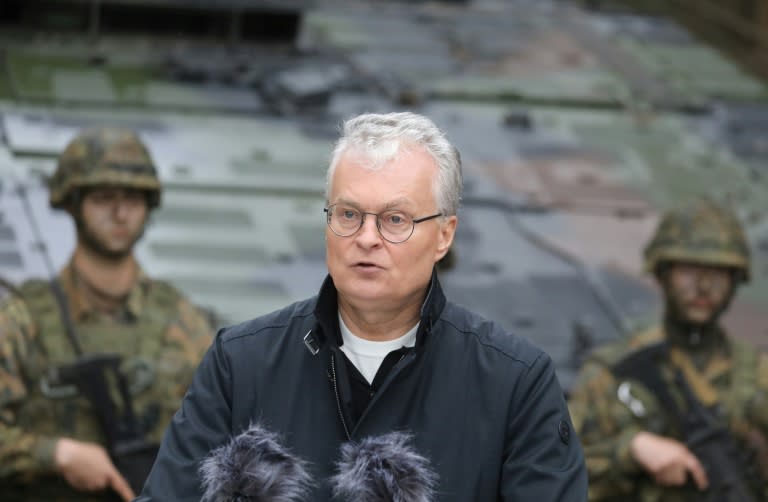Concern about Russia dominates as Lithuanians vote

- Oops!Something went wrong.Please try again later.
- Oops!Something went wrong.Please try again later.
Lithuania voted Sunday in a presidential election dominated by security concerns with the main candidates all agreed the NATO and EU member should boost defence spending to counter the perceived threat from neighbouring Russia.
The Baltic state of 2.8 million people fears it could be next in Russia's crosshairs if Moscow wins its war against Ukraine.
While the top three contenders agree on defence, they have diverging views on social issues and on Lithuania's relations with China, which have been strained for years over Taiwan.
"Lithuania's understanding of the Russian threat is unanimous and unquestionable, so the main candidates are following suit," Eastern Europe Studies Centre director Linas Kojala told AFP.
Polls close at 1700 GMT and the result is expected later on Sunday -- but a run-off on May 26 will probably be needed with no candidate expected to win an overall majority.
Opinion polls give the incumbent, 59-year-old former banker Gitanas Nauseda, a comfortable lead over the other seven candidates, who include Prime Minister Ingrida Simonyte and prominent lawyer Ignas Vegele.
Pensioner Aldona Majauskiene, 82, told AFP she had voted for Nauseda because "he is the best in every category".
53-year-old civil servant Airine said she voted for Simonyte and expects less populism from the future president.
"I am not voting for faces, I am voting for those who really can help boost our security and quality of living," she said.
The Lithuanian president steers defence and foreign policy, attending EU and NATO summits, but must consult with the government and parliament on appointing the most senior officials.
Lithuania, a former Soviet republic, is a top donor to Ukraine and a big defence spender, with a military budget currently equal to 2.75 percent of GDP.
- Defence budget -
The Simonyte-led government is expected to come forward with proposals within weeks that could help lift defence spending to three percent of GDP.
Lithuania intends to use the funds to purchase tanks and additional air defence systems, and to host a German brigade, as Berlin plans to complete the stationing of around 5,000 troops by 2027.
None of the top candidates appears to question these plans, but Vegele has pledged to ask for a defence audit to effectively manage finances if elected.
Nauseda is projected to receive more than 35 percent of first round votes and is expected to prevail in any eventual run-off.
Vegele, a 48-year-old lawyer who gained prominence after speaking out against mandated vaccination during the pandemic, presents himself as an alternative to established politicians and vows more transparent governance.
Simonyte, 49, is a fiscal conservative with liberal views on social issues. She notably supports same-sex partnerships, which still stir controversy in the predominantly Catholic country.
Simonyte is running for president for a second time after losing to Nauseda in a run-off in 2019.
"Simonyte is supported by conservative party voters and liberal people, while Nauseda is a candidate of the left in terms of economic and social policy," Vilnius University analyst Ramunas Vilpisauskas told AFP.
Meanwhile, "Vegele will get support from those who simply want change", he added.
- Tensions over Taiwan -
The uneasy relationship between Nauseda and his rival Simonyte's ruling conservatives has at times triggered foreign policy debates, most notably on Lithuania's relations with China.
Bilateral ties turned tense in 2021, when Vilnius allowed Taiwan to open a de facto embassy under the island's name in a departure from the common diplomatic practice of using the name of the capital Taipei to avoid angering Beijing.
China, which considers Taiwan a part of its territory and bristles at anything that might lend the island any sense of international legitimacy, downgraded diplomatic relations with Vilnius and blocked its exports, causing some Lithuanian politicians to urge a restoration of relations for economic reasons.
"China's reaction to the opening of the office was harsher than predicted, and that sparked the debate," Kojala said, adding China's response was hurting local businesses.
sau-amj/cw

